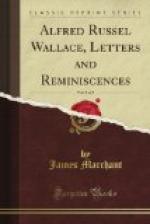He had noticed that certain definite conditions appeared to be absolutely essential to the origin and development of the higher types of terrestrial life, and that most of these must have been certainly dependent on a very delicate balance of the forces concerned in the evolution of our planet. Our position in the solar system appeared to him to be peculiar and unique because, he thought, we may be almost sure that these conditions do not coexist on any other planet, and that we have no good reason to believe that other planets could have maintained over a period of millions of years the complex and equable conditions absolutely necessary to the existence of the higher forms of terrestrial life. Therefore it appeared to him to be proved that our earth does really stand alone in the solar system by reason of its special adaptation for the development of human life.
Granting this, however, the question might still be asked, Why should not any one of the suns in other parts of space possess planets as well adapted as our own to develop the higher forms of organic life? These questions cannot be answered definitely; but there are reasons, he considered, why the central position which we occupy may alone be suitable. It is almost certain that electricity and other mysterious radiant forces (of which we have so recently discovered the existence) have played an important part in the origin and development of organised life, and it does not appear to be extravagant to assume that the extraordinary way in which these cosmic forces have remained hidden from us may be due to that central position which we are found to occupy in the whole universe of matter discoverable by us. Indeed, it may well be that these wonderful forces of the ether are more irregular—and perhaps more violent—in their effect upon matter in what may be termed the outer chambers of that universe, and that they are only so nicely balanced, so uniform in their action, and so concealed from us, as to be fit to aid in the development of organic life in that central portion of the stellar system which our globe occupies. Should these views as to the unique central position of our earth be supported by the results of further research, it will certainly rank as the most extraordinary and perhaps the most important of the many discoveries of the past century.
While still working on this section of his “Wonderful Century,” he was asked to write a scientific article, upon any subject of his own choice, for the New York Independent. And as the idea of the unique position of the earth to be the abode of human life was fresh in his mind, he thought it would prove interesting to the general public. However, before his article appeared simultaneously in the American papers and in the Fortnightly Review, a friend who read it was so impressed with its originality and treatment that he persuaded Wallace to enlarge it into book form; and it appeared in the autumn of 1903 as “Man’s Place in the Universe.”




